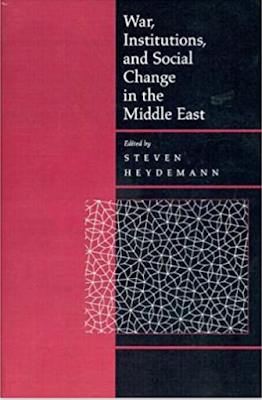Heydemann, Steven, Editor, War, Institutions, and Social Change in the Middle East, Berkeley, Los Angeles, London: University of California Press, 2000
War, Institutions, and Social Change in the Middle East is an anthology of around a dozen articles about how war impacted the Middle East. Unlike most collections this one is remarkably consistent with one interesting piece after another. The editor Steven Heydemann wanted to put together articles that contradicted the Eurocentric view dominant in academia at the time that the changes Europe went through during wars in the 1600-1700s were applicable around the world.
The book covers the span of modern Middle East History. One article argued that it was mostly material concerns that determined which tribes in Jordan joined the Arab Revolt against the Ottomans during World War I. Those that had their markets and trade controlled by the Ottomans were much more likely to stay loyal than those that didn’t. Another article was about how Middle Eastern Jews who were discriminated against and segregated in low income areas in Israel demanded equal rights with those from Europe after the 1967 War. A third was about how the militarization of the Palestinian Liberation Organization led it mirror the autocratic governments of the region. There are a few that don’t reach to that level such as one about World War II era Egypt and how an Allied supply center changed labor relations. It’s very dry having to explain all the details about the Allied system before getting to Egypt. Still, that’s the exception in this book rather than the rule.
“War as a Vehicle for the Rise and Demise of a State-Controlled Society” detailed how the militarization of society and the constant threat of war contributed to the rise of Saddam Hussein. Author Isam al-Khafaji wrote about how Iraq’s institutions were gutted by military rule that started in 1958 which ended a very flawed democracy in Iraq. The Baath seized control in 1968 and stressed Iraq as the armed protector of the Arab nation. That became Saddam’s main justification for the Iran-Iraq War where he portrayed himself as an Arab hero. The Baath also regularized violence against internal opponents such as the Kurds who were accused of being traitors to the Iraqi state and Shiites who were called Persians. The constant threat of fighting both inside and outside the country was used to mobilize and control the public and legitimize the regime. Khafaji argued that war went hand in hand with centralizing power and creating a dictatorship in Iraq. He joins others that have noted how Iraqi history set the stage for how Saddam ruled the state. He learned from the past and built on what previous rulers had done.
Heydemann collected together a series of very strong articles about war, politics, economics and society in the modern Middle East. A few can be skipped but most of them provide some really good insights into different countries in the region.
Link to all of Musings On Iraq’s book reviews listed by topic





No comments:
Post a Comment